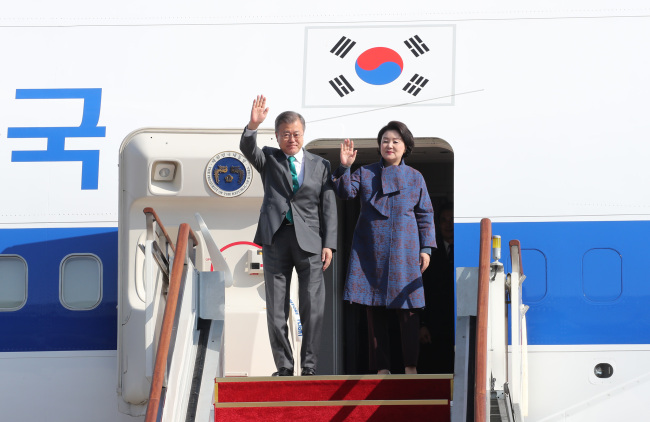Cheong Wa Dae, meanwhile, denied Sunday a Japanese media report that the failure to issue a joint statement after the South Korean-EU meeting stemmed from Seoul’s reluctance toward the use of the expression “complete, verifiable, irreversible denuclearization” of North Korea.
It said the unusual absence of a joint statement had more to do with the EU’s demand for including words related to the Iran nuclear deal and Ukraine crisis, which Seoul see as a potential point of diplomatic friction with the US and Russia, the presidential office said.
The EU and other Asian leaders on Friday expressed support for the deal that US President Donald Trump pulled out of in May. Trump claimed that Joint Comprehensive Plan of Action did nothing to stop Iran developing missiles or destabilizing the Middle East and the Gulf regions.
“The failure to adopt the statement was not due to the CVID expression, but because of EU’s demand to put clauses related to JCPOA that differs from the US and Russian position,” a senior Cheong Wa Dae official told reporters under the condition of anonymity.
The presidential office said the most outstanding outcome of the presidential trip is Pope’s virtual pledge to visit North Korea -- a move that the Moon administration believes can help North Korea outgrow the image of a pariah state with repressive control over its people.
When Moon relayed a verbal invitation from North Korean leader Kim Jong-un, the pope said he would visit North Korea “if officially invited,” according to the presidential office. Moon held a 35-minute closed-door meeting in the Vatican on Thursday.
A senior Vatican official said if some conditions are met, the pope will seriously consider the possibility of an unprecedented visit to North Korea. No pope has ever traveled to the North, which is known for its heavy restrictions on religious freedom.
“The pope expressed his willingness. We have to wait for (the invitation) to be formalized,” Reuters quoted Vatican Secretary of State Cardinal Pietro Parolin, the Holy See’s second-ranking official, as telling reporters Thursday evening.
Moon also devoted most of the trip to asking European countries to help North Korea open up its economy. For that, the president introduced bold initiatives to help the impoverished North overcome its decadeslong economic backwardness.
In his remarks during his trip to Denmark on Saturday, Moon said the international community should help North Korea adopt a growth model that can achieve economic growth and sustainable development.
Among those development models are green growth, Moon told the audience at the summit of Partnering for Green Growth and the Global Goals 2030, citing solving the water pollution problem in Pyongyang as an example.
“For countries like North Korea who have not followed the path of economic growth centered on manufacturing, I think we can help them adopt a growth model that can achieve economic growth and sustainable development simultaneously,” Moon said.
The trip appears to have failed to remove what Moon sees as a major hurdle for North Korea’s economic growth: sanctions imposed by the United Nations for the North’s missile and nuclear tests.
While Moon stressed that North Korea’s steps toward denuclearization should be rewarded with a more comprehensive compensation, the European countries remained insistent that the sanctions pressure must remain.
The countries, particularly those who have permanent seats at the UN Security Council, called for a “complete, verifiable, irreversible denuclearization” of North Korea, a phrase that is now largely shunned by Washington following the first-ever US-North Korea summit in Singapore.
“We need to have progress to do anything more diplomatically,” French President Emmanuel Macron said at a meeting with Moon on Monday last week, adding that that the UNSC permanent member states will remain in favor of keeping the UN sanctions in place.
The mixed outcome of the presidential trip is likely to aggravated political fight over Moon’s rapprochement policy with North Korea.
While Moon’s governing Democratic Party praised the president for taking the lead in promoting peace on the Korean Peninsula, the opposition bloc criticized Moon for projecting an image of defending North Korea’s position to the international community.
“President Moon went beyond the role of meditating between North Korea and the US,” Democratic Party’s spokesperson Lee Hae-sik said Sunday. “His trip to Europe has expanded such role into the international community.”
The conservative Liberty Korea Party, however, struck a different tone. The main opposition party’s spokesperson Yoon Young-seok blamed Moon for launching a “preemptive campaign” for sanctions relief and reinforcing speculation that South Korea is pushing North Korea’s agenda on its behalf.
By Yeo Jun-suk (
jasonyeo@heraldcorp.com)








